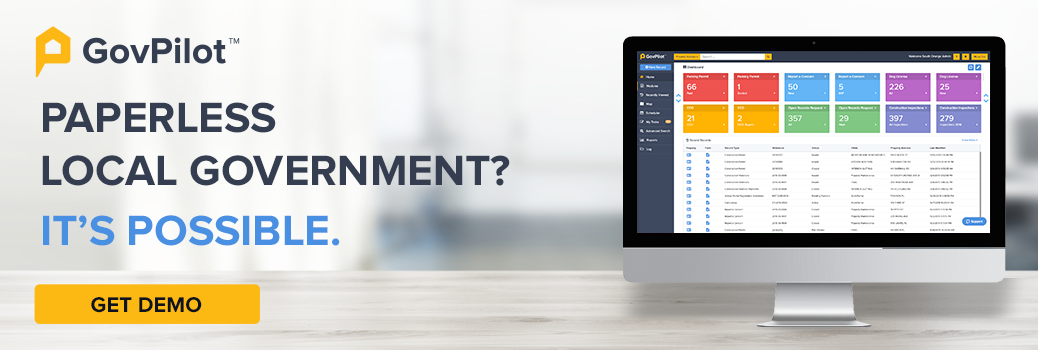As society moves online, local governments are expected to follow suit with a variety of services being moved to a more digital, online presence. Younger generations are at a vantage point because of their direct exposure to the explosive technological revolution in the last two decades. Older generations are being asked to work to understand technology which is a much more laborious task than it may seem. Riddled with complexities and foreign language, technology is fast moving and takes hard work to understand.
Statistics of local representatives nationally have shown that elected officials average 60 years old in the United States. Digital literacy was not demanded in the professional space until the early 2000’s, making the average representative well into adulthood and their careers before being asked to incorporate technology into their profession. Local officials should put forth time and effort to move their government operations to an online capacity- it is well worth it due to all the benefits of moving online. Benefits include the preservation of employee manpower, saving money and time by ensuring technology keeps your offices working as efficiently as possible.
This guide seeks to help transition government operations online and give officials the tools they need to navigate and adjust to the digital transformation. Follow along with this guide to learn more!
What Does Moving To An Online Capacity Really Mean?
Moving to an online capacity is the modernization of traditional government tasks to more digital, efficient online methods. . Adopting digital tools holds the potential to transform the government’s role in the community.
Digitization of government services is done with the intention of maximizing efficiency, which will benefit the community in an impactful way! Transitioning to an online capacity takes previously confusing and lengthy processes and automates them, guiding the user through the steps. Progressing towards a more online presence helps your municipal government to work more cohesively with the growing world of technology. Show your organizations’ embracement of a more unified community, with their best interest in mind by transforming once manual, expensive, time-consuming processes into a faster, safer online capacity.
Six Key Reasons Governments Should Move Operations Online
Governments should move to an online, digital capacity for countless reasons, here are just a few:
1. Paper-Based and Manual Processes Are Modernized
The traditional methodology for many processes require seemingly endless paperwork, tedious organization, and profuse manpower. Moving to an online capacity is taking those traditional processes and streamlining them with software that automates services. Clerical workers in local government offices are overwhelmed with the amount of forms and paperwork involved in day to day needs in the office. Moving online consolidates paper-based, manual processes into a platform that minimizes the heap of physical forms, automatically filing and storing for easy access.
2. Time Savings
Efforts that were previously allocated to managing and organizing paper-based processes can then be freed to be put towards a more worthy cause. Reading through and filing forms is a time consuming process, where that time may be better spent elsewhere. Statistics reported by ACP state that the average office worker spends 1.5 hours a day “looking for things”. Digitizing pertinent paperwork and files could result in a weekly time savings of 7.5 hours per employee!
Government management software solutions like GovPilot leverage cloud technology, facilitating seamless online access to stored and filed documents. This not only enhances efficiency but also eliminates the necessity for constituents to commute to and from city hall. The user-friendly digital platform is designed to minimize time spent on website navigation, further contributing to time savings and reducing potential confusion for users.
Learn all about Government Website Design Tips 2023: UX, SEO, & More for Local Governments here.
3. Cost Savings
The benefits of eliminating paper-based workflows are seen in multiple iterations. For example, reduction in paper and printing costs alone is an excellent cost saver. Research indicates that companies and organizations spend around $30 million dollars a year on paper, printing, and organizational storage alone. Efficiency in resource utilization by transitioning to a cloud storage platform reserves human labor and time for savings in wage costs.
Consider 8 Local Government Revenue Generation Sources from GovPilot here.
4. Reduced Carbon Footprint
As humans, we have a duty to reduce our carbon footprint in the interest of preserving the planet as best we can. What may seem like small, insignificant changes can have a big impact. Transitioning to online formatting permits an appreciable decrease in paper production. Online forms are the sustainable, eco-friendly option, saving hundreds of thousands pieces of paper from being used needlessly. In addition, the online formatting makes filling out and filing forms an option from anywhere in the world. A remote option eradicates the need for transportation to and from the government office, for both employees and citizens, granting additional opportunities to diminish our carbon footprint.
Read our Local Government Sustainability Guide.
5. Constituent Convenience
While benefits will be felt greatly on the administrative end of this transition to online formatting, constituents are absolutely considered. Complaints about the current paper-based workflows are generated by constituents, with feelings of frustration about the confusing labyrinth of paperwork and uncertainty about succeeding steps involved in filling with their local government office.
Additionally, moving online shows citizens that their government recognizes the busy lives their community members lead. Navigating standard operating hours while working a full time job, some running their own businesses, is an unrealistic expectation. The transition online makes any form fully accessible from anywhere in the world, at any time of day while automating the process step by step.
Check out our Local Government Community Engagement Strategies.
6. Improved Government Efficiency
With the elimination of manual filing and storage, that time is then freed to be applied to more pressing matters. For example, without the burden of unnecessary paperwork clerks may then apply that time expediting the approval and denial of license and certification applications. Communities will see projects move forward without traditional expected delays, and with improved government workflows therefore completing by the projected end date, maybe even sooner!
Challenges Governments Face Moving Online and How to Combat Them
Moving online can present many challenges for municipalities that have a current traditional and manual government workflow. Here is how to get ahead of those challenges with our strategies:
-
Employee Hesitancy
Employees often experience a sense of security and reliability within traditional paper-based workflows, viewing them as established norms that provide a familiar and dependable routine. The prospect of departing from these well-established practices and transitioning to an unfamiliar technological landscape may be perceived as a significant deviation. Consequently, hesitancy in embracing such changes is not only anticipated but also understood.
Recommendation
Offices should be open and receptive to the concerns and criticisms the staff may have in order to know how to aid in this transition. To ease the hesitation of government officials', focus should be shifted to comprehensive training with open communication channels. With appropriate technical support and effective change management, the team may curate an environment conducive to a successful and acceptive digital transformation.
Learn more about Strategies for Training the Older Workforce on GovTech With GovPilot here.
Lack of Employee Technology Skills
Considering the statistics surrounding the average age of government representatives and employees, it is unsurprising that the digital literacy of those agents is not exceptional. Therefore, asking those employees to transition their work to a medium they do not have fluency in is a daunting idea.
Recommendation
Addressing these apprehensions requires patience and emphasizing the significant potential of the new methodology. It is crucial for the office to take responsibility for ensuring that employees receive proper training. Bringing in experienced staff for this purpose can help alleviate any reservations.
Consider How to Train Government Workers on Cyber Security Threats here.
Outdated Technology
When you take the reluctance of staff into consideration, it is predictable that the office may not have up to date technology. With the conventional paper-based model, premium technology is not necessary, nor is a good Wi-Fi connection or reliable access to the internet.
Recommendation
This situation can be readily addressed by tapping into technology grants aimed at securing funding for essential software systems and cutting-edge technology updates. Government officials, along with their communities, have a golden opportunity to embrace the innovative potential of online processes. It's an opportune moment to foster excitement and actively seek out funding opportunities and grants that align with the vision of integrating advanced technology solutions.
Cybersecurity Concerns and Privacy Issues
Governments shoulder the pivotal responsibility of safeguarding and managing sensitive information, and the transition to an online environment not only underscores the imperative of this duty but also introduces the potential vulnerability of such data to a spectrum of cyber threats, encompassing hacking, data breaches, and cyber-attacks.
Recommendation
Fortunately with care and attention in your choice of government management software, you can employ software that has incredible security measures that protect your data. GovPilot uses enterprise-grade security products & services, coupled with collaboration with third-party security experts who conduct assessments and penetration tests to ensure robust security measures.
Digital Inclusion and Accessibility
With the transition, some people may be left behind. While training will be offered to staff, they cannot go into the homes of every citizen and give them the same hands-on help. There are similar concerns of digital literacy but additional worry of constituent’s ability to afford internet access.
Recommendation
Governments need to ensure that online services are fully accessible to all citizens. Local libraries have open access to computers with staff available to help guide community members through potential difficulties. It is important that governments consider their population and have a willingness to cater to all regardless of socioeconomic status, age, or physical ability.
Consider How To Improve Municipal Services for Underserved Community Members here.
Face The Challenges and Go Digital
We strongly advocate for local government offices to take proactive steps towards embracing the transition to online workflows. This pivotal shift promises increased efficiency, reduced paperwork, and improved accessibility. To facilitate a seamless and successful adoption, we invite you to book a consultation with GovPilot!
Digital Government FAQ’s:
Why is moving online important for government operations?
- As representatives of the public, government operations need to stay updated with their citizenry. Efficiency is an essential quality of government agencies and any way to streamline operations can transform how a government functions.
Learn more about Local Government Employee Appreciation Strategy here.
How can govpilot software help move governments to a digital age?
- GovPilot is meticulously crafted to ensure that the transition to online processes is not only seamless but also remarkably easy. Our software systems are thoughtfully designed with your needs at the forefront, prioritizing a user-friendly and adaptable experience.
Read On:
- Best Public Sector Software 2023: Ways Governments Use Technology to Save Time & Money
- Government Continuity Strategy 2023: Procedures During a Crisis
- AI in Government in 2023 and Beyond: Bringing Artificial Intelligence to Your Municipality
- What is Azure for Government? Everything to Know
- What is Municipal Software? Understanding Government Software for Municipalities & Counties
- 7 Government Cybersecurity Best Practices 2023: Keep Data Secure & Prevent Ransomware Attacks
- 13 Benefits of Digital Transformation for Local Government 2023






